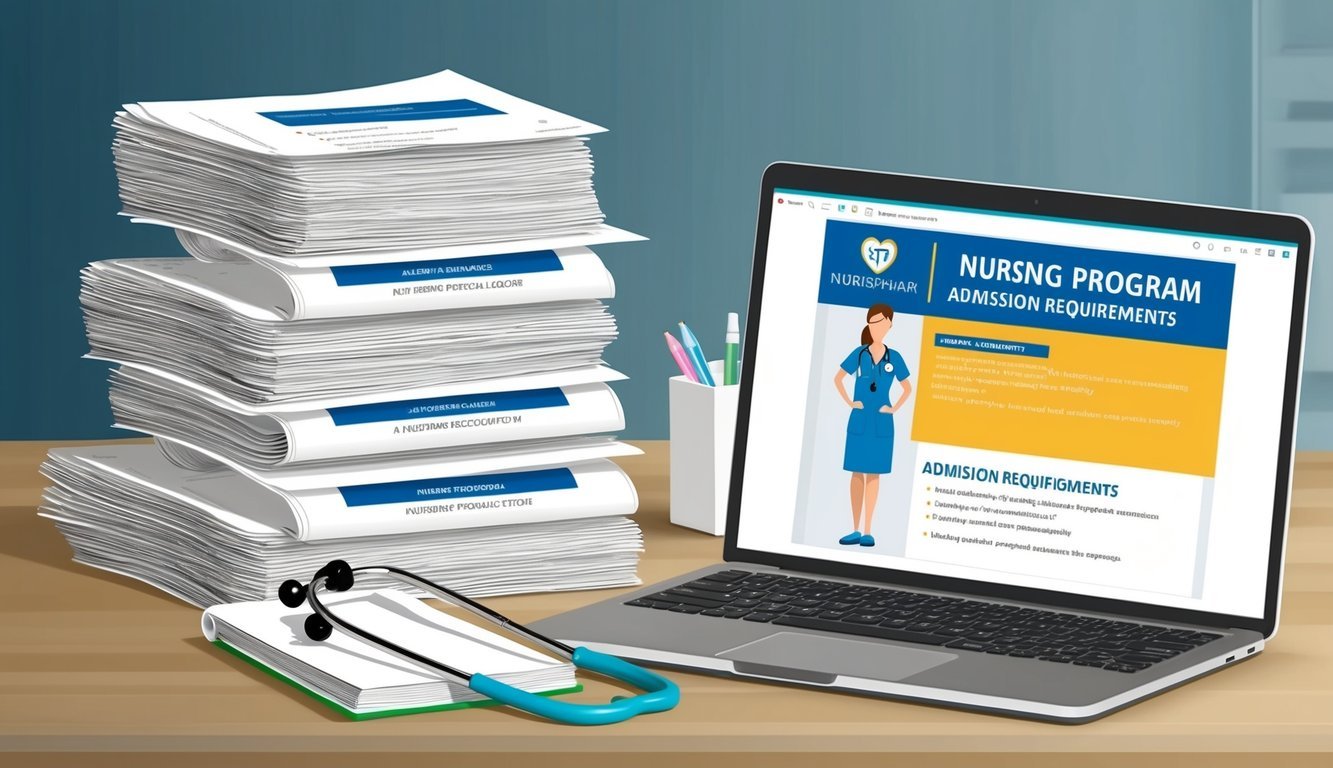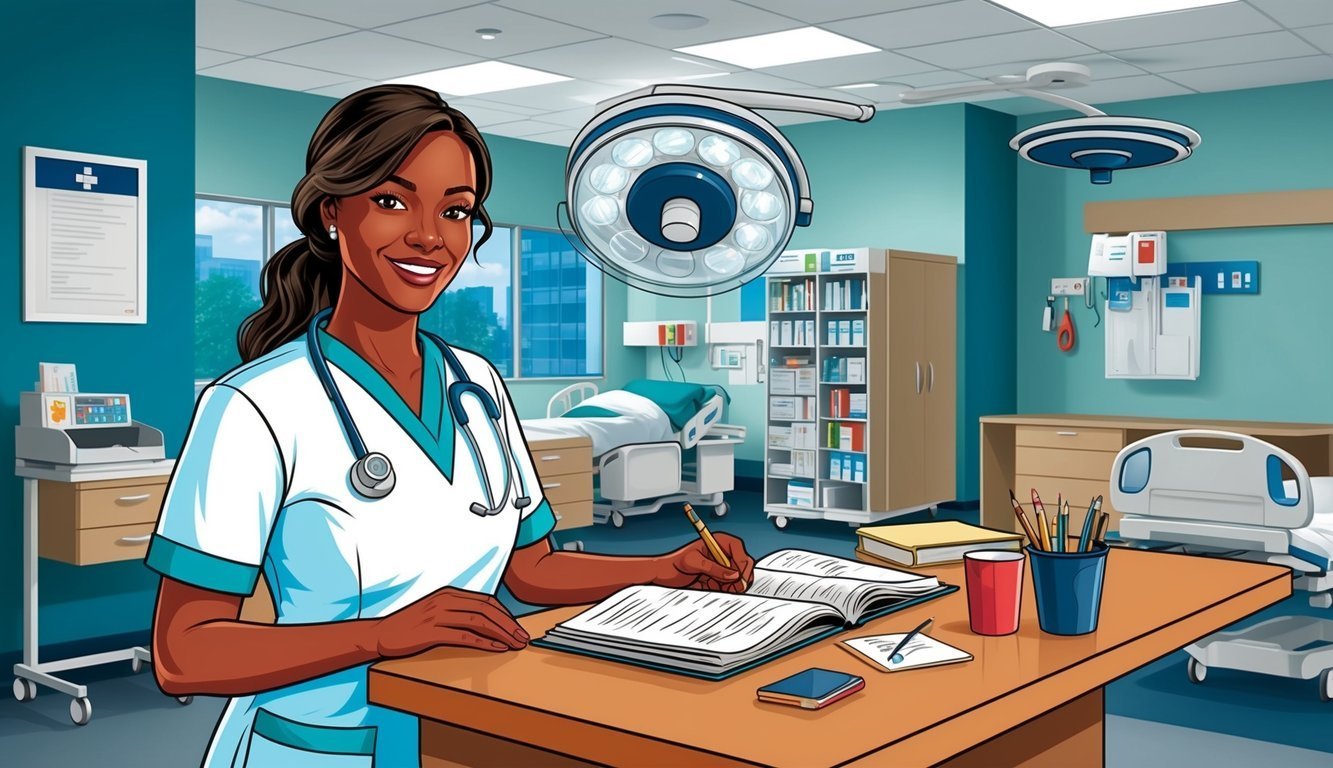Two-year nursing programs in Pennsylvania offer a practical path to becoming a registered nurse.
These programs usually take about 24 months to complete and provide both theoretical knowledge and hands-on clinical experience. Enrolling in a two-year nursing program in Pennsylvania allows you to gain the skills needed to start a rewarding career in healthcare more quickly than traditional four-year programs.
As you explore available programs, you will find a range of options that cater to different schedules and lifestyles.
Many institutions offer flexible class times and online components to accommodate students who may be balancing work and study.
With robust support systems and financial aid options available, pursuing a nursing degree in Pennsylvania is an accessible choice for many.
Key Takeaways
- Two-year nursing programs in Pennsylvania prepare you for licensure and a career in nursing.
- Many programs offer flexible schedules and financial support to help students succeed.
- Practical training is emphasized alongside coursework, ensuring you are job-ready upon graduation.
Overview of Nursing Education in Pennsylvania

Nursing education in Pennsylvania offers a variety of accredited programs that prepare students for a rewarding career in healthcare.
Focusing on the importance of accredited programs and the types of nursing degrees available helps you make informed choices about your education.
Importance of Accredited Programs
Accredited programs ensure that you receive a quality education that meets industry standards.
Without accreditation, a degree may not be recognized by employers or state licensing boards.
This is crucial for passing the NCLEX-RN exam, which is required for becoming a registered nurse.
Several schools in Pennsylvania, such as Pennsylvania College of Technology and Montgomery County Community College, are known for their accredited nursing programs.
These institutions provide the necessary coursework, clinical experiences, and training to prepare you for a successful nursing career.
Types of Nursing Programs Available
Pennsylvania offers multiple nursing programs catering to various educational backgrounds.
The primary types of programs include:
-
Associate Degree in Nursing (ADN): Typically a 2-year program. Schools such as Pennsylvania College of Technology and Montgomery County Community College focus on this pathway.
-
Bachelor of Science in Nursing (BSN): This 4-year degree offers a more comprehensive education, including leadership and research.
-
LPN to RN Programs: Designed for Licensed Practical Nurses wanting to advance their careers.
Each program type has its own curriculum, ranging from clinical practice to healthcare ethics, ensuring you gain the essential skills needed for patient care.
By choosing an accredited program, you enhance your employment prospects in the competitive nursing field.
Admission Requirements and Prerequisites

To enter a 2-year nursing program in Pennsylvania, you must meet specific admission criteria and complete prerequisite courses.
Understanding these requirements will help you prepare effectively for your application.
Academic Criteria
Most nursing programs require a high school diploma or equivalent.
You need to maintain a minimum GPA, usually around 3.0 or higher.
Certain programs may also request standardized test scores, such as the SAT or ACT.
You will typically need to complete specific prerequisite courses.
Common courses include:
| Course | Description |
|---|---|
| Biology | Foundations of human biology and anatomy. |
| Chemistry | Basic principles of chemistry applicable to nursing. |
| Psychology | Understanding of human behavior and mental health. |
| Algebra | Essential math skills are necessary for dosage calculations. |
Check each program’s website for the exact requirements.
Essential Skills and Qualifications
In addition to academic criteria, personal qualities are vital for your success in nursing.
Compassion and respect toward patients and colleagues are paramount.
You should also exhibit strong communication skills.
This ability helps you interact effectively with diverse groups.
Some programs may require a personal statement or letters of recommendation.
These documents allow you to showcase your dedication to the field.
Be prepared to demonstrate your commitment to nursing values.
Many programs look for applicants who are passionate about helping others.
Thoroughly review each program’s specific requirements to ensure you meet all criteria before applying.
This preparation is crucial to your acceptance into a nursing program in Pennsylvania.
Curriculum and Clinical Training

In a 2-year nursing program in Pennsylvania, you will encounter a structured curriculum that balances theoretical knowledge with practical skills.
This combination prepares you for the demands of a nursing career.
The coursework typically includes essential nursing core courses and hands-on clinical experiences.
Nursing Core Courses
The nursing core courses are designed to provide you with the foundational knowledge necessary for clinical practice.
Key subjects often include:
- Fundamentals of Nursing: This course covers basic nursing skills and patient care.
- Pharmacology: You will learn about medications, their effects, and safe administration.
- Maternal and Child Health Nursing: This focuses on caring for mothers and their children.
- Medical-Surgical Nursing: You will study care for adults with various health issues.
These courses establish a strong understanding of nursing principles and practices, crucial for passing licensure exams.
Many programs maintain high NCLEX pass rates, reflecting the effectiveness of their curriculum.
For more details, check this ADN program overview.
Hands-On Clinical Experiences
Hands-on clinical experiences are a vital part of your education.
From the first day, you will engage in practical training that allows you to apply classroom knowledge in real-world settings.
You will gain experience in various healthcare environments, such as:
- Hospitals: Inpatient care offers insight into daily nursing duties.
- Clinics: Outpatient settings allow for interaction with diverse patient populations.
- Long-term Care Facilities: You will understand chronic disease management and elderly care.
These experiences help you develop critical skills like patient assessment, communication, and teamwork.
Effective clinical training prepares you for the challenges of nursing roles.
For more information on the clinical training structure, you can visit Geisinger School of Nursing.
Key Pennsylvania Nursing Institutions

Pennsylvania is home to several prestigious nursing institutions that offer 2-year programs.
These schools equip students with the skills needed to excel in nursing careers.
Below are key institutions you should consider.
Drexel University
Drexel University provides a robust nursing program that prepares you for diverse clinical settings.
Their Associate Degree in Nursing (ADN) focuses on both practical and theoretical aspects of nursing.
You’ll experience hands-on training through clinical placements.
The program is known for its innovative teaching methods and a strong emphasis on technology in healthcare.
Drexel also fosters a collaborative environment, encouraging teamwork among students.
With a comprehensive curriculum, you will cover essential nursing topics and gain experience through simulations and real-world clinical practice.
For more details, visit Drexel University Nursing.
University of Pennsylvania
The University of Pennsylvania offers a highly regarded nursing program, focusing on excellence in healthcare education.
Though primarily known for its Bachelor of Science in Nursing (BSN), you can explore options that support a smooth transition into nursing.
The program emphasizes research and evidence-based practice, preparing you for challenges in modern healthcare settings.
You will benefit from the university’s vast resources and experienced faculty, who guide your learning journey.
Penn’s nursing graduates consistently achieve high pass rates on the NCLEX, aiding their successful entry into the nursing field.
Learn more at University of Pennsylvania Nursing.
Villanova University
Villanova University combines a rigorous academic environment with a strong sense of community in its nursing programs.
The Associate Degree in Nursing prepares you with both fundamental nursing knowledge and practical skills.
You will experience a blend of classroom instruction and clinical practice, allowing you to apply your learning in real healthcare settings.
Villanova emphasizes ethical nursing practices and holistic patient care.
Additionally, Villanova boasts strong partnerships with local healthcare facilities, enhancing internship opportunities for students.
To explore more, check out Villanova University Nursing.
Licensing and Career Opportunities
As a graduate of a 2-year nursing program, you have opportunities to become a registered nurse (RN) by passing the NCLEX-RN exam.
This will open doors to various employment sectors and roles within the healthcare field.
Passing the NCLEX-RN Exam
To practice as a registered nurse, you must pass the NCLEX-RN exam.
This national licensing exam tests your knowledge and skills gained during your nursing education.
Here are some key points about the exam:
- Eligibility: You need to complete an accredited nursing program.
- Format: The exam is computer-adaptive, adjusting the difficulty based on your answers.
- Topics Covered: It includes areas such as health promotion, safety, and psychosocial integrity.
You can find more resources on preparing for the exam at RegisteredNursing.org.
Employment Sectors and Roles
Once you achieve your RN license, you can explore various employment sectors.
Here are some common areas where you may work:
| Employment Sector | Common Roles |
|---|---|
| Hospitals | Staff Nurse, Charge Nurse |
| Clinics | Nurse Practitioner (NP) |
| Long-term Care Facilities | Geriatric Nurse |
| Home Health Agencies | Home Health Nurse |
| Schools | School Nurse |
As an RN, your roles may include patient care, education, and advocacy.
Positions in nursing often offer competitive salaries along with opportunities for advancement, especially if you consider further education, such as obtaining a Bachelor of Science in Nursing (BSN).
Financial Considerations and Support

When considering a 2-year nursing program in Pennsylvania, understanding tuition costs and available financial support is crucial.
This information can help you plan better and relieve some of your financial burdens.
Understanding Tuition Costs
Tuition costs for 2-year nursing programs in Pennsylvania can vary widely.
On average, you might expect to pay between $10,000 and $20,000 for the full program.
Public community colleges tend to have lower tuition rates, often around $10,000.
In contrast, private institutions may charge higher fees, sometimes reaching $25,000.
It’s important to check the specific nursing school to find exact figures.
Additionally, consider other costs like textbooks, supplies, and fees associated with clinical practices.
Seeking schools with competitive tuition and transparent pricing can greatly benefit your financial planning.
Scholarships and Financial Aid
Financial aid and scholarships can significantly reduce your overall costs.
Many schools offer specific scholarships for nursing students.
These may range from a few hundred to several thousand dollars.
You can apply for federal financial aid by filling out the FAFSA form.
This can lead to grants, work-study opportunities, and low-interest loans.
Here are common sources of aid to look for:
- State Grants: Pennsylvania offers grants for eligible residents.
- Institutional Scholarships: Check with your chosen school for available awards.
- Professional Organizations: Groups like the American Nurses Association often have scholarships.
It’s beneficial to research and apply for as many scholarships as possible.
Financial support can make a significant difference in achieving your nursing career goal without overwhelming debt.
Frequently Asked Questions
This section addresses common questions about two-year nursing programs in Pennsylvania.
It covers accreditation, online availability, costs, enrollment requirements, career opportunities, and curriculum differences.
What are the best accredited two-year nursing programs in Pennsylvania?
Some of the best accredited two-year nursing programs include those at Pennsylvania College of Technology, and the Community College of Beaver County.
These programs provide essential training and prepare you for the Registered Nurse (RN) licensing exam.
Are there any online two-year nursing programs available in Pennsylvania?
Yes, there are online options for two-year nursing programs in Pennsylvania.
Many colleges offer hybrid programs that combine online coursework with required in-person clinical experiences.
Researching individual schools is essential to find the best fit for your needs.
How does the cost of two-year nursing programs in Pennsylvania compare?
Tuition costs can vary widely depending on the institution.
In-state tuition is generally more affordable than out-of-state rates.
For example, programs can range from around $10,000 to $20,000 for the entire course.
It’s a good idea to explore financial aid options.
What are the requirements for enrolling in a two-year nursing program in Pennsylvania?
To enroll, you typically need a high school diploma or GED.
Some programs may require specific prerequisite courses, such as biology or chemistry.
A strong GPA and letters of recommendation can also enhance your application.
What is the difference in career opportunities between a two-year RN and a four-year BSN?
A two-year RN degree allows you to work as a registered nurse, but a four-year Bachelor of Science in Nursing (BSN) opens up more advanced opportunities.
BSN graduates often qualify for management, specialized care roles, and have better job prospects in competitive areas.
How does a two-year RN program differ from a four-year nursing program?
The two-year program focuses on core nursing skills and clinical practice.
Meanwhile, the four-year program includes additional courses in leadership, research, and community health.
This broader education prepares BSN graduates for a wider range of nursing specialties.

